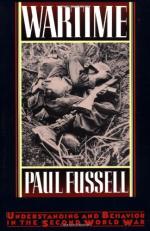
|
| Name: _________________________ | Period: ___________________ |
This test consists of 5 short answer questions, 10 short essay questions, and 1 (of 3) essay topics.
Short Answer Questions
1. Which of the following is an example of an official idiom first used in World War II?
2. Many terms that persisted after the war had what quality?
3. What were depictions of combat conditions like in media of the era?
4. Contrary to the media's presentation, the author believed that most allied victories were due to what factors?
5. What was one of the causes of the lack of quality in the media and other outlets during the war?
Short Essay Questions
1. What does RADAR stand for?
2. What were American soldiers told they were fighting for?
3. What does the author believe about the phenomenon of attributing high-minded ideals to the purpose of a war?
4. What is one way that a person could become considered to be subversive?
5. What were the most important types of media during the war?
6. How did the average soldier view the war?
7. What critical knowledge did an average soldier typically lack?
8. How did the media interpret the suffering of the nation's citizenry?
9. How did most media outlets react to the requirements placed on them?
10. How were books adapted for soldiers' use, and how did these changes persist after the war?
Essay Topics
Write an essay for ONE of the following topics:
Essay Topic 1
During the war, the official state media and the public media colluded together to create a uniform and sterilized presentation of the war.
1) Explain how and why the public and state media colluded with each other during the war, and what the results of this collusion were.
2) Discuss why was it considered important to present a unified and homogeneous vision of the war's progress.
3) Discuss the morale nature of the decision to control and suppress the freedom of the media during the war. Explain some of the justifications for these actions and make a final assessment as to whether or not this trend was morally acceptable.
Essay Topic 2
Throughout the second World War, soldiers faced constant hazing from their officers. Although largely successful in helping to establish and maintain discipline, these measures were always demeaning, and sometimes dangerous.
1) Explain the unofficial policy of hazing in the US military during World War II.
2) Discuss why this policy was used, and what the army expected to gain through it.
3) Describe some of the unintended side-effects of hazing on the enlisted men.
Essay Topic 3
Americans placed great stock in their new lines of heavy bombers, which were predicted to be able to win the war quickly and easily, but the reality proved very different.
1) Explain why Americans put so much faith and hope in the doctrine of precision bombing.
2) Explain the doctrine of precision bombing and how it was expected to end the war.
3) Discuss the difficulties in implementing a campaign of precision bombing, and how American strategy changed as a result.
|
This section contains 689 words (approx. 3 pages at 300 words per page) |

|




